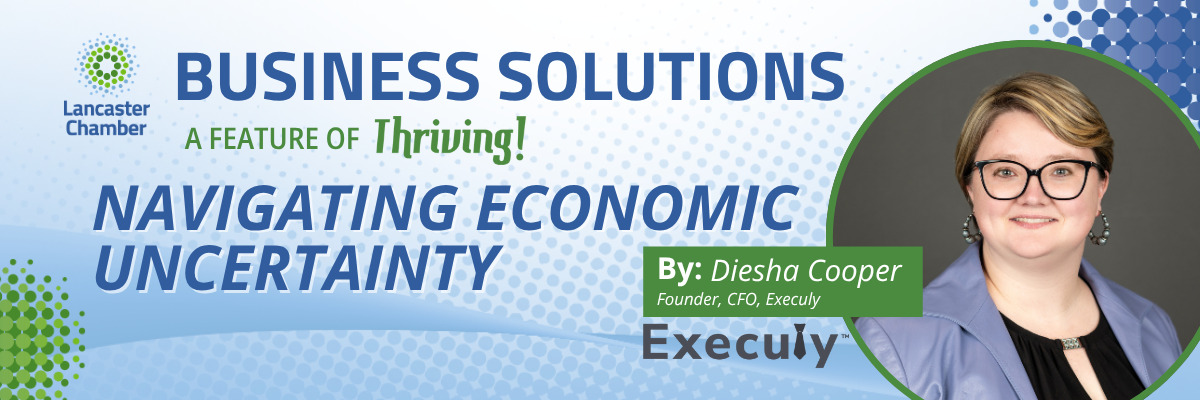By Diesha Cooper, Founder, CFO, Execuly | diesha@execuly.com
A Business Solutions feature piece from our Spring 2025 issue of the Lancaster Thriving Publication.
In business, uncertainty isn’t an exception—it’s the rule, and those who learn to ride the waves instead of fight them will always come out ahead. I’ve watched businesses navigate these unpredictable swings—some barely hanging on, while others come out even stronger. The difference? It’s not luck or sheer size. It’s the ability to step back, evaluate the new reality, and make smart, strategic moves instead of reacting out of fear. Business sustainability isn’t about avoiding change—it’s about mastering it.
Let’s start with the basics: Not all economic fluctuations are created equal. Big-picture shifts—like inflation, interest rates, or recessions—affect industries at large, but at a smaller level, businesses also deal with their own economic waves. Maybe a new competitor enters the market, customer preferences evolve, or supply chain issues shake things up. These micro-level shifts can feel just as impactful as a national recession if you’re not prepared for them.
So, what makes a business resilient? It’s not about being the biggest or having the deepest pockets. It’s about adaptability. The ability to recognize shifts early and respond with confidence. When economic conditions change, some businesses freeze, while others see it as an opportunity to refine what they offer, streamline operations, or rethink how they serve their customers. That’s where real sustainability happens.
One of the biggest challenges I see is businesses waiting too long to make adjustments. When cash flow starts tightening, the instinct is often to cut everything—marketing, new investments, even talent. But the most successful businesses approach downturns strategically. Instead of making fear-driven cuts, they focus on optimizing. They double down on their most profitable services, build deeper relationships with existing customers, and find efficiencies without compromising growth. They also keep an eye on the bigger picture, recognizing that economic downturns don’t last forever. Those who use the time wisely come out stronger on the other side.
Another critical factor? Understanding your customers’ shifting needs. When economic conditions change, so do buying habits. That doesn’t mean people stop spending altogether, but they do become more selective. The businesses that thrive are the ones that listen, adjust, and meet their customers where they are—whether that means repositioning their offerings, adjusting pricing models, or expanding into new channels.
The key to long-term sustainability is preparation. Instead of scrambling when the next economic shift hits, businesses should be thinking ahead, creating adaptable strategies that allow them to pivot quickly. That might mean diversifying revenue streams, keeping debt manageable, or staying up to date on market trends. More than anything, it means embracing change as a constant.
At the end of the day, no business is immune to economic shifts, but the ones that succeed treat uncertainty as an opportunity rather than a threat. The question isn’t if the next wave will come—it’s how ready will you be when it does.

Execuly is a boutique consulting firm specializing in fractional executive services for small businesses. With a focus on strategic leadership, financial management, and operational efficiency, Execuly helps businesses scale sustainably while maintaining control of their operations. By providing executive-level expertise on a flexible basis, Execuly ensures that small businesses have the high-level guidance they need to grow without the overhead of a full-time hire. The approach is hands-on, results-driven, and tailored to the unique challenges of small business operations.
not secure

